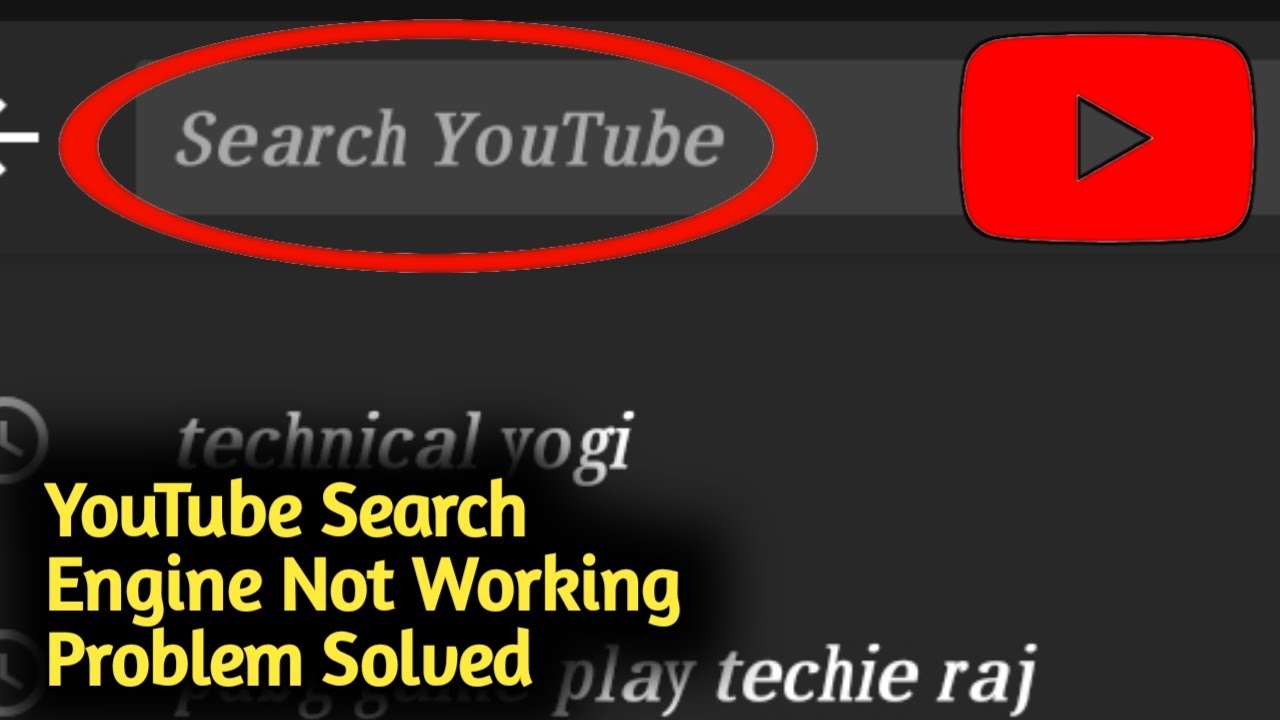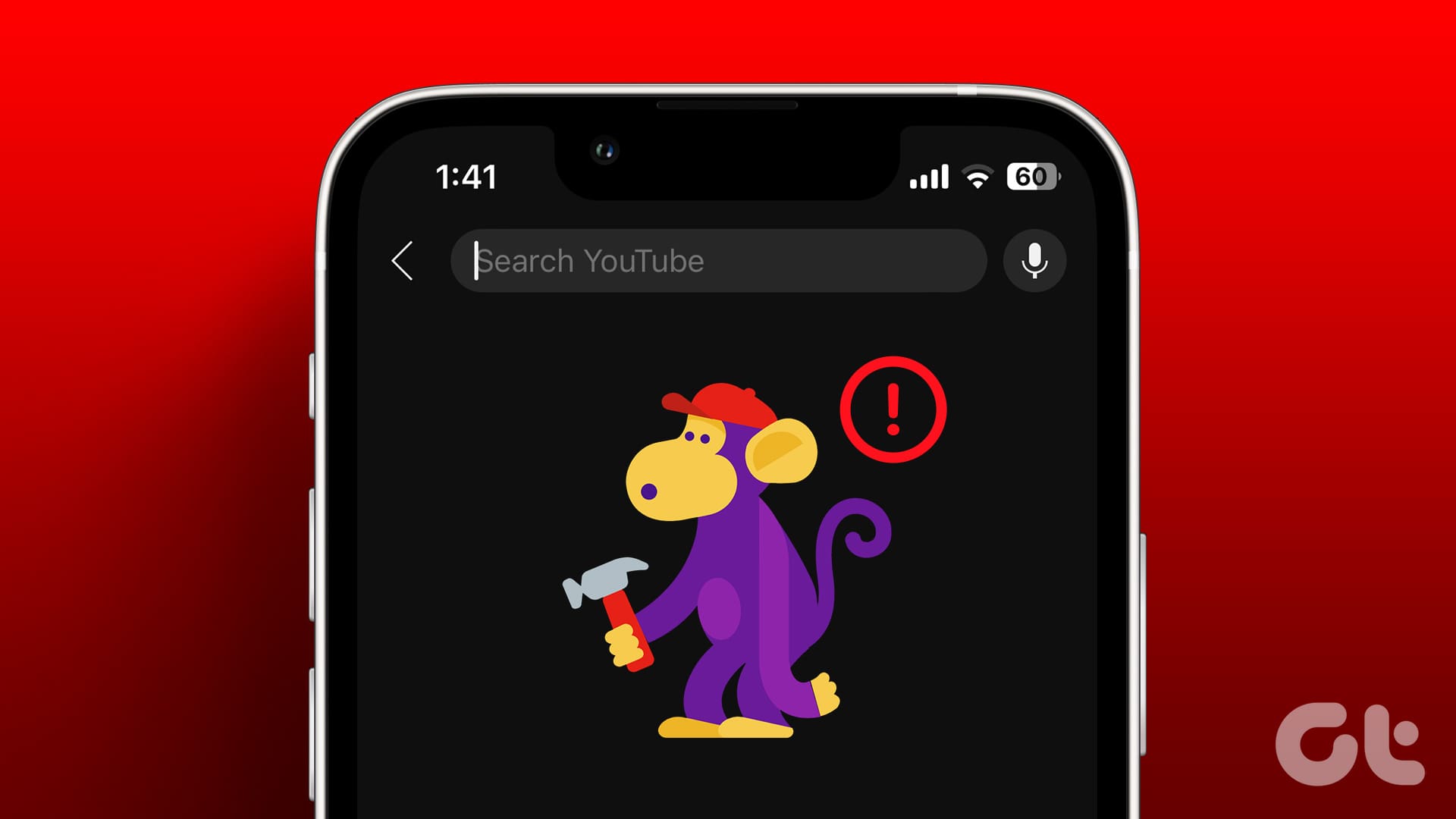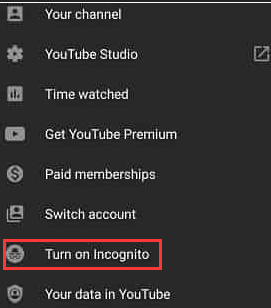YouTube is an incredible platform that connects billions of users with a vast array of videos. However, many creators and viewers often face frustrating challenges while navigating the search functionality. From irrelevant results to difficulty in finding niche content, the problems seem to be multifaceted. In this blog post, we’ll explore some of the common issues with YouTube's search and dive deeper into the reasons behind these struggles. Whether you're a casual viewer or a content creator, understanding these challenges can help improve your YouTube experience.
Understanding YouTube's Search Algorithm

At the heart of YouTube’s search issues is its complex search algorithm. This algorithm processes a vast amount of data, aiming to serve relevant videos to users quickly. However, its design has led to some notable challenges.
Firstly, one key issue is that the algorithm prioritizes popularity over relevance. This means that videos with higher views, likes, and engagement tend to surface at the top of the search results. While this approach works well to highlight trending content, it can actually push niche or less popular videos further down, making it hard for viewers to discover unique content. Here are a couple of examples:
- A small creator's educational video might be buried under a viral reaction video.
- Local events or community-specific topics may get overshadowed by global trends.
Another challenge arises from the algorithm's reliance on keywords and tags. Creators often struggle to optimize their video metadata effectively, leading to inconsistent or inaccurate search results. Sometimes, well-intentioned tags can even hurt a video’s visibility if they're deemed misleading by the algorithm. This creates a vicious cycle where creators constantly tweak their metadata in hopes of hitting the right algorithmic sweet spot.
Moreover, YouTube’s algorithm is also affected by user behavior. The platform tracks what users watch, what they skip, and how long they stay engaged with content. This data, while useful, can sometimes contribute to a feedback loop that promotes repetitive content. For instance, if a user frequently watches cooking videos, they might be presented with more of the same, making it difficult to find varied content.
In addition, YouTube’s AI strives to understand video content through various technologies, including automatic captioning and image recognition. However, these systems are not infallible. They can misinterpret the subject matter, leading to inaccurate search results. For instance, a video on “dog training” may show up in searches for “animal care” when the AI misreads the content. This lack of precision can be frustrating for users seeking specific information.
Finally, regional differences also play a role. Search results can vary significantly based on a user’s location, which can further complicate the search experience. Some content may be restricted in certain areas, leading to a lack of diversity in search results for users in those locations.
In conclusion, understanding YouTube's search algorithm and its complexities sheds light on the common problems faced by users. The interplay of popularity, user behavior, and AI interpretation leads to an often inconsistent search experience. As YouTube continues to evolve, hopefully, these challenges will be addressed, allowing for a more intuitive and user-friendly search process.
Also Read This: Can You Stream YouTube TV on Discord? How to Share Your Viewing Experience
3. Common Problems Users Face with YouTube Search

YouTube is a treasure trove of content, but using its search function can sometimes feel more like a treasure hunt—one where the map is a bit blurry. Let's dive into some of the common problems users encounter while searching on YouTube.
- Irrelevant Search Results: You might type in something specific, like "how to bake a chocolate cake," and instead get a list that includes videos about "best chocolate cake recipes." While related, it’s frustrating when the results aren’t quite what you were looking for.
- Overwhelming Number of Videos: With millions of videos uploaded every day, it’s easy to get lost in a sea of choices. Sometimes, you just want a succinct answer to a question, not a 30-minute tutorial on the subject.
- Minor Misspellings: Typing errors happen to the best of us! Unfortunately, if you misspell a word or two, you might find yourself staring at a bunch of unrelated content. YouTube's algorithm isn’t always forgiving when it comes to typos.
- Filters and Sorting Issues: While it’s nice that YouTube offers various filters (like upload date, duration, etc.), sometimes these features work against you. For instance, using filters might limit your results too much, causing you to miss out on some valuable content.
- Content Creator Algorithms: As much as we appreciate our favorite YouTubers, the platform can skew towards popular channels, which means smaller or newer creators may not show up in your searches, even if their content is better suited to your needs.
All these problems can lead to a frustrating experience. It’s not just about what you search for but how the search results align with what you want. You might find yourself having to sift through an avalanche of videos, some of which don't even come close to addressing your needs. But hang tight; the next section will explore the crux of the issue—search results and relevance.
Also Read This: How to Retrieve Your Deleted History on YouTube
4. Search Results and Relevance: What’s Going Wrong?

So, what exactly is happening behind the scenes at YouTube when you hit that search button? Well, the search algorithm is supposed to be smart and get you the results you want, but sometimes it misses the mark. Here are some insights into why search results might be off:
- User Engagement Metrics: YouTube’s algorithm often prioritizes videos with high engagement—views, likes, and comments. This means that even if a video isn't the most relevant to your search, it can still show up high in the results because it’s popular. It's like asking for a local diner recommendation and getting a chain restaurant because everyone goes there.
- Keyword Stuffing: Some content creators stuff their titles and descriptions with keywords to climb the search rankings. While this can be effective, it can also lead users to irrelevant content. It’s a little like a clickbait scenario—great headlines, but the content? Not so great.
- Video Format Bias: Videos that are longer or formatted in certain ways might be favored over shorter clips, even if they aren't as informative. Users might want quick, digestible content, but YouTube might be trying to push more in-depth videos instead.
- Search History Influence: YouTube personalizes search results based on your past activity. While personalization can be beneficial, it sometimes creates a bubble, meaning users may not discover new channels or content types outside their usual preferences.
- Language and Localization Issues: Language barriers can also skew search results. If you’re looking for a specific term in one language but the algorithm provides results in another, that disconnect can lead to disappointment.
With all these gears turning behind the curtain, it’s clear that while YouTube’s search capabilities are impressive, there’s still room for improvement. Understanding these issues can give users a little insight into their search frustrations, and maybe even a better strategy for finding the gems they’re looking for. Don’t worry, though; as technology progresses, hopefully, these problems will be addressed, enhancing everyone’s YouTube experience in the process!
Also Read This: How to Change a YouTube Thumbnail: A Simple Process
5. The Impact of Video Metadata on Search Performance
When it comes to YouTube search, video metadata is like the backbone of your content. You might be wondering, "What exactly is video metadata?" Well, it's essentially the information you provide about your video, including the title, description, and tags. These elements serve as signals to YouTube's algorithm about what your video is really about. So, let’s dive a little deeper into why metadata matters so much for search performance.
Titles: Your video title is the first thing viewers notice, and it's crucial for search optimization. A clear and compelling title can increase click-through rates significantly. Use keywords that accurately represent your content but avoid clickbait tactics, as these can backfire in viewer retention and credibility.
Descriptions: YouTube gives you a generous amount of space to describe your video—use it wisely! The first few lines should be especially engaging, as they often appear in search results. Aim to include relevant keywords naturally within your description, but also make sure to provide enough context so that viewers can discern the value of your content right away.
Tags: Tags are another essential component of metadata. They help YouTube understand the context of your video. Use a mix of broad and specific tags. For example, if your video is about baking a chocolate cake, include tags like “baking,” “chocolate cake,” and “dessert recipes.” However, don’t overload your video with irrelevant tags, as this can confuse the algorithm.
In summary, neglecting video metadata can significantly hinder your search performance on YouTube. Spend time crafting thoughtful titles, engaging descriptions, and meaningful tags to make sure your content stands out in a crowded space. Remember, good metadata is not just about optimization; it's about providing value to your audience. The better you can communicate what your video is about, the more likely it is to be served up in search results.
Also Read This: Can I Watch YouTube TV in Two Different Houses? Exploring YouTube TV's Multi-location Use
6. How User Behavior Affects YouTube Search Results
YouTube is a platform powered by user engagement, and understanding user behavior can offer insights into how to optimize your content for better visibility. User behavior encompasses everything from how long viewers watch your videos to how they interact with your content, and all these factors weigh heavily on search results. Let’s explore a few key elements.
- Watch Time: This is perhaps the most crucial metric. The more time viewers spend watching your video, the more YouTube assumes that your content is valuable. Higher watch time can lead to better rankings in search results.
- Click-Through Rate (CTR): This is the percentage of people who click on your video after seeing the thumbnail and title in search results. A higher CTR signals to YouTube that your content is appealing, which can improve its search ranking.
- Engagement Metrics: Likes, comments, shares, and the number of subscribers gained after viewing a video all contribute to its perceived value. The more engagement your video receives, the more likely it is to be promoted in searches. Encourage viewers to like and comment by asking questions or prompting discussions within your content.
- Viewer Retention: Retention is about how many people finish watching your video. If people drop off shortly after starting, it can negatively impact your rankings. Try to hook your audience in the first 30 seconds!
In a nutshell, understanding user behavior is crucial for optimizing your content on YouTube. Focus on crafting compelling content that keeps viewers engaged from start to finish. The more you understand how your audience interacts with your videos, the better you can tailor your strategies to meet their needs, ultimately boosting your visibility in search results.
Also Read This: How YouTube Channels Get Bodycam Footage
7. Solutions and Tips for Improving Your Search Experience
So, you've encountered some hiccups while searching on YouTube? You're definitely not alone. Many users face these challenges, but thankfully, there are ways to make your search experience a lot smoother. Here are some practical tips and solutions that can help you find the content you're looking for more efficiently:
- Use Specific Search Terms: Instead of typing a generic keyword, try to be as specific as possible. For example, instead of searching for "cooking," you might enter "Italian pasta recipe for beginners." This narrows down the results and gets you closer to the content that fits your needs.
- Take Advantage of Filters: After performing a search, use the filter options provided by YouTube. You can filter by upload date, type of content (like videos, channels, or playlists), and duration, which can help refine your results significantly.
- Utilize Quotation Marks: If you're searching for an exact phrase, put the text in quotation marks. This tells YouTube to show only the videos that contain that specific phrase, rather than just related keywords.
- Keep an Eye on Your Search History: YouTube often provides personalized recommendations based on your search and viewing history. If you're logged in, check this out to find relevant videos you may have missed.
- Clear Your Cache and Cookies: Sometimes, issues with search results can stem from your browser. Clearing your cache and cookies can resolve some bugs and refresh your browsing experience.
- Report Problems: If you consistently have issues with search results, don’t hesitate to report the problem to YouTube. They rely on user feedback to improve their algorithms and user experience.
By implementing these strategies, you can enhance your YouTube search experience and hopefully mitigate some of the issues we discussed earlier. Remember, the more specific and intentional you are with your searches, the better your results will be!
8. Conclusion: The Future of YouTube Search and User Experience
As we wrap up our discussion on YouTube search challenges and solutions, it’s clear that the platform is continuously evolving. YouTube is not just a video-sharing site anymore; it’s become a vast ecosystem of content creators, trends, and community interactions. So, what does the future hold for YouTube search and user experience?
Here are some trends and predictions to keep an eye on:
- Enhanced AI Algorithms: YouTube is likely to improve its AI algorithms further, making them more adept at understanding user intent. This means better results based on context rather than just keywords, providing a more personalized experience.
- Improved Voice Search: With voice search growing in popularity, we might see YouTube investing more in optimizing its platform for voice queries. This could lead to a surge in content being created specifically for voice-activated search, like tutorials that give verbal instructions.
- Augmented Reality (AR) Features: Imagine searching for a video on how to fix a bike and being directed to an interactive AR experience that guides you through the process in real-time! While that might sound futuristic, advancements in AR could redefine how users interact with content.
- User Empowerment: YouTube may focus on giving users more control over search settings and preferences, allowing for tailored experiences. Features like blocking certain types of content or refining recommendations could become standard.
In conclusion, while the current search challenges on YouTube are real, the platform's future looks promising. With technological advancements and user-centric changes, we can expect an ever-evolving landscape that prioritizes efficient and satisfactory user experiences. As content creators and viewers, let’s stay engaged and adaptable as these changes unfold!
 admin
admin








